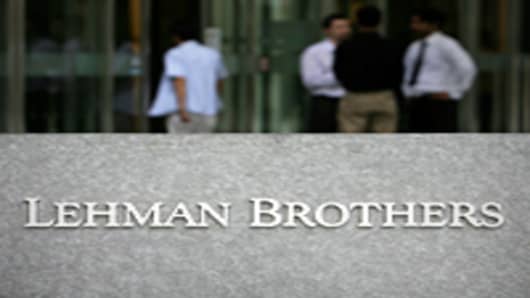As markets around the world prepared for another turbulent week, worries that a rerun of the events of 2008 is in the cards are adding touncertainty, investors told CNBC Monday.
"Everyone in the States is watching Europe closely and especially what's going on with European banks," Steve Massocca, managing director at Wedbush Securities, told CNBC Monday.
"There are memories of 2008 when Bear Stearns and Lehman were unable to finance themselves when you look at highly leveraged banks unable to fund their overnight borrowings."
"There are also worries about the extent to which US financial institutions are involved," he added.He believes the Fed has "reached the end of their rope."
The fall of Lehman Brothers in September 2008 triggered the last financial crisis.
Ben Bernanke, chairman of the Federal Reserve, will address policymakers and academics Friday after a key meeting at Jackson Hole.
Last year, he used the speech as an opportunity to float the idea of further quantitative easing.
"We are concerned that there's a law of diminishing returns here," Nick Beecroft, senior markets consultant at Saxo Bank, told CNBC."We might see a bounce if there's further QE but it would be very short-lived."
While markets await Bernanke's speech, the week is relatively light on scheduled news about the US and European economies.
"There's a bit of a vacuum on newsflow between the start of the week and Jackson Hole on Friday," said Jeremy Stretch, head of currency strategy at CIBC.
"Europe is the issue that markets want resolved right now," Patrick Armstrong, managing partner, Armstrong Investment Managers, said."We need a bigger bailout fund as precursor to a Eurobond and more fiscal integration to allow for a Eurobond."
German Chancellor Angela Merkel said over the weekend that a Euro bond would be the "wrong answer" to the euro zone's problems.
"There's a real sense now that Germans feel that this hasn't been sold to them well enough," said Neil Dwane, chief investment officer, Europe, RCM."It will take the Germans at least two years constitutionally before they can allow this to happen."
The UK, the biggest European economy that is not in the euro zone, needs to watch the current problems in Switzerland, where the Swiss National Bank has taken action to ease the Swiss franc after worries that its strength could damage exports further.
"We could end up looking like Switzerland, with a very, very strong pound at a time when we don't want a very strong pound, with very serious ramifications for the economy," said Dwane.
As the price of oil fell following the apparent ousting of Libyan leader Muammar Gaddafi's government, and gold hit yet another new high, Armstrong said that investors should start looking at defensive stocks.
"The environment is toxic for traditional equities and bond investors," he said.
He believes that high-yield defensive stocks, in sectors such as healthcare and telecommunications, could provide a safe haven for investors.
Massocca agreed that there are "increasingly cheap" dividend-yielding stocks out there.



